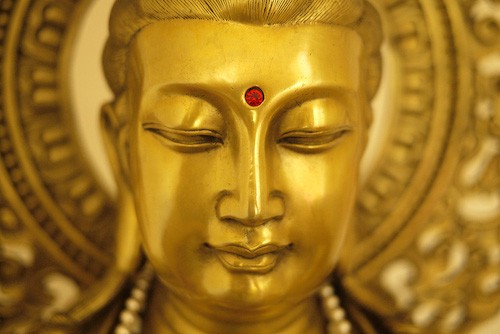Aspiring and engaging bodhicitta

There are two levels in the development of bodhicitta—the mind dedicated to attaining awakening for the benefit of all sentient beings. These are the aspiring and engaging bodhicitta. A person with the aspiring bodhicitta wants to attain awakening for the benefit of all sentient beings, but he or she is not yet prepared to engage in all the practices necessary to do so. A person who has generated the engaging bodhicitta joyfully engages in the bodhisattva’s six far-reaching practices by taking the bodhisattva precepts. The difference between aspiring and engaging bodhicitta is similar to the difference between wanting to go to Dharamsala and actually getting onto the transport and traveling there.
The bodhisattva precepts are taken on the basis of having taken refuge in the Three Jewels and some or all of the five lay precepts. Buddha prescribed the precepts in order to protect us from doing actions that bring unhappy results and to help us attain awakening quickly and easily. Therefore, precepts are not burdens to bear but are ornaments to be worn joyfully.
The eight precepts of aspiring bodhicitta
After generating aspiring bodhicitta before the guru and the Three Jewels, you should observe eight precepts in order to protect your bodhicitta from degenerating in this and future lives.
How to protect your bodhicitta from degenerating in this life:
- Remember the advantages of bodhicitta repeatedly.
- To strengthen your bodhicitta, generate the thought to attain awakening for the benefit of all sentient beings three times in the morning and three times in the evening. Recitation and contemplation of the prayer for taking refuge and generating the bodhicitta is a good way to fulfill this.
- Do not give up working for sentient beings even when they are harmful.
- To enhance your bodhicitta, accumulate both merit and wisdom continuously.
How to prevent being separated from bodhicitta in future lives:
The four remaining precepts are explained in two complementary sets of four. These are:
Abandon the four harmful actions:
- Deceiving your guru, abbot or other holy beings with lies.
- Causing others to regret virtuous actions that they have done.
- Abusing or criticizing bodhisattvas or the Mahayana.
- Not acting with a pure selfless wish but with pretension and deceit.
Practice the four constructive actions:
- Abandon deliberately deceiving and lying to gurus, abbots and so forth.
- Be straightforward, without pretension or deceit.
- Generate the recognition of bodhisattvas as your teachers and praise them.
- Assume the responsibility yourself to lead all sentient beings to awakening.
The bodhisattva ethical code1
The 18 root bodhisattva precepts
When a precept has more than one aspect, doing just one aspect constitutes a transgression of the precept.
- a) Praising yourself or b) belittling others because of attachment to receiving material offerings, praise, and respect.
- a) Not giving material aid or b) not teaching the Dharma to those who are suffering and without a protector, because of miserliness.
- a) Not listening although another declares his/her offence or b) with anger blaming him/her and retaliating.
- a) Abandoning the Mahayana by saying that Mahayana texts are not the words of Buddha or b) teaching what appears to be the Dharma but is not.
- Taking things belonging to a) Buddha, b) Dharma or c) Sangha.
- Abandoning the holy Dharma by saying that texts which teach the three vehicles are not the Buddha’s word.
- With anger a) depriving ordained ones of their robes, beating and imprisoning them, or b) causing them to lose their ordination even if they have impure morality, for example, by saying that being ordained is useless.
- Committing any of the five extremely destructive actions: a) killing your mother, b) killing your father, c) killing an arhat, d) intentionally drawing blood from a Buddha, or e) causing schism in the Sangha community by supporting and spreading sectarian views.
- Holding distorted views (which are contrary to the teachings of Buddha, such as denying the existence of the Three Jewels or the law of cause and effect, etc.)
- Destroying a a) town, b) village, c) city, or d) large area by means such as fire, bombs, pollution, or black magic.
- Teaching emptiness to those whose minds are unprepared.
- Causing those who have entered the Mahayana to turn away from working for the full awakening of Buddhahood and encouraging them to work merely for their own liberation from suffering.
- Causing others to abandon completely their precepts of self-liberation and embrace the Mahayana.
- Holding and causing others to hold the view that the Fundamental Vehicle does not abandon attachment and other delusions.
- Falsely saying that you have realized profound emptiness and that if others meditate as you have, they will realize emptiness and become as great and as highly realized as you.
- Taking gifts from others who were encouraged to give you things originally intended as offerings to the Three Jewels. Not giving things to the Three Jewels that others have given you to give to them, or accepting property stolen from the Three Jewels.
- a) Causing those engaged in serenity meditation to give it up by giving their belongings to those who are merely reciting texts or b) making bad disciplinary rules which cause a spiritual community not to be harmonious.
- Abandoning the two bodhicittas (aspiring and engaging).
Four binding factors must be present to completely transgress sixteen of the root precepts. The transgression of two precepts, numbers 9 and 18, requires only the act itself. These four are:
- Not regarding your action as destructive, or not caring that it is even though you recognize that the action is transgressing a precept.
- Not abandoning the thought to do the action again.
- Being happy and rejoicing in the action.
- Not having a sense of integrity or consideration for others regarding what you have done.
To keep yourself from experiencing the results of transgressing the precepts, purify by means of the four opponent powers. Prostrations to the 35 Buddhas and the Vajrasattva meditation are excellent methods to purify transgressions. If your bodhisattva ordination has been damaged by completely breaking a root precept, purify and then retake the precepts before a spiritual master or before the objects of refuge—the Buddhas and bodhisattvas—that you have visualized.
The 46 auxillary bodhisattva precepts
To eliminate obstacles to the far-reaching practice of generosity and obstacles to the ethical discipline of gathering virtuous actions, abandon:
-
- Not making offerings to the Three Jewels every day with your body, speech, and mind.
- Acting out selfish thoughts of desire to gain material possessions or reputation.
- Not respecting your elders (those who have taken the bodhisattva precepts before you have or who have more experience than you do).
- Not answering sincerely asked questions that you are capable of answering.
- Not accepting invitations from others out of anger, pride, or other negative thoughts.
- Not accepting gifts of money, gold, or other precious substances that others offer to you.
- Not giving the Dharma to those who desire it.
To eliminate obstacles to the far-reaching practice of ethical discipline, abandon:
-
- Forsaking those who have broken their ethical discipline: not giving them advice or not relieving their guilt.
- Not acting in accord with your pratimoksa precepts.
- Doing only limited actions to benefit sentient beings, such as strictly keeping the Vinaya rules in situations when not doing so would be of greater benefit to others.
- Not doing non-virtuous actions of body and speech with loving-compassion when circumstances deem it necessary in order to benefit others.
- Willingly accepting things that either yourself or others have obtained by any of the wrong livelihoods of hypocrisy, hinting, flattery, coercion or bribery.
- Being distracted by and having a strong attachment to amusement, or without any beneficial purpose leading others to join in distracting activities.
- Believing and saying that followers of the Mahayana should remain in cyclic existence and not try to attain liberation from delusions
- Not abandoning destructive actions which cause you to have a bad reputation.
- Not correcting your own deluded actions or not helping others to correct theirs.
To eliminate obstacles to the far-reaching practice of fortitude, abandon:
To eliminate obstacles to the far-reaching practice of joyous effort, abandon:
-
- Gathering a circle of friends or disciples because of your desire for respect or profit.
- Not dispelling the three types of laziness (sloth, attraction to destructive actions, and self-pity and discouragement).
- With attachment, spending time idly talking and joking.
To eliminate obstacles to the far-reaching practice of meditative stabilization, abandon:
-
- Not seeking the means to develop concentration, such as proper instructions and the right conditions necessary to do so. Not practicing the instructions once you have received them.
- Not abandoning the five obscurations which hinder meditative stabilization: excitement and regret, harmful thought, sleep and dullness, desire, and doubt.
- Seeing the good qualities of the taste of meditative stabilization and becoming attached to it.
To eliminate obstacles to the far-reaching practice of wisdom, abandon:
-
- Abandoning the scriptures or paths of the Fundamental Vehicle as unnecessary for one following the Mahayana.
- Exerting effort principally in another system of practice while neglecting the one you already have, the Mahayana.
- Without a good reason, exerting effort to learn or practice the treatises of non-Buddhists which are not proper objects of your endeavor.
- Beginning to favor and take delight in the treatises of non-Buddhists although studying them for a good reason.
- Abandoning any part of the Mahayana by thinking it is uninteresting or unpleasant.
- Praising yourself or belittling others because of pride, anger, and so on.
- Not going to Dharma gatherings or teachings.
- Despising the Spiritual Mentor or the meaning of the teachings and relying instead on their mere words; that is, if a teacher does not express him/herself well, not trying to understand the meaning of what he/she says, but criticizing.
To eliminate obstacles to the morality of benefiting others, abandon:
- Not helping those who are in need.
- Avoiding taking care of the sick.
- Not alleviating the sufferings of others.
- Not explaining what is proper conduct to those who are reckless.
- Not benefiting in return those who have benefited you.
- Not relieving the sorrow of others.
- Not giving material possessions to those in need.
- Not working for the welfare of your circle of friends, disciples, servants, etc.
- Not acting in accordance with the wishes of others if doing so does not bring harm to yourself or others.
- Not praising those with good qualities.
- Not acting with whatever means are necessary according to the circumstances to stop someone who is doing harmful actions.
- Not using miraculous powers, if you possess this ability, in order to stop others from doing destructive actions.
The following explanation of the bodhisattva precepts is drawn from Twenty Stanzas by the Indian sage Chandragomin. He compiled the precepts from various sources: root precepts 1-4 and the forty-six auxiliary precepts are from the Bodhisattva Bhumi by Asanga; root precepts 5-17 are from the Sutra of Akasagarbha, and one precept is from the Sutra of Skillful Means. ↩
Venerable Thubten Chodron
Venerable Chodron emphasizes the practical application of Buddha’s teachings in our daily lives and is especially skilled at explaining them in ways easily understood and practiced by Westerners. She is well known for her warm, humorous, and lucid teachings. She was ordained as a Buddhist nun in 1977 by Kyabje Ling Rinpoche in Dharamsala, India, and in 1986 she received bhikshuni (full) ordination in Taiwan. Read her full bio.


